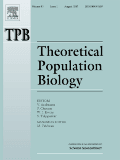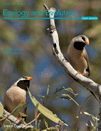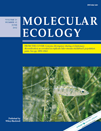
Evolution Letters
metrics 2024
Connecting scholars to the latest in evolutionary studies.
Introduction
Evolution Letters is a premier Open Access journal published by Oxford University Press, dedicated to advancing research in the interdisciplinary fields of Ecology, Evolution, and Genetics. Since its launch in 2017, this journal has rapidly established itself as a leading platform for high-quality research and innovative studies, as reflected by its impressive Q1 quartile rankings in both Ecology, Evolution, Behavior and Systematics and Genetics for 2023. With a remarkable Scopus ranking placing it in the top 3% in its categories, Evolution Letters serves as a vital resource for scholars and practitioners seeking to understand the complexities of evolutionary processes and genetic developments. The journal’s commitment to Open Access ensures that groundbreaking research is freely available to the global scientific community, fostering collaboration, discovery, and progress in these critical fields of study.
Metrics 2024
 -
- 3.40
3.40 4.80
4.80 -
-Metrics History
Rank 2024
IF (Web Of Science)
JCI (Web Of Science)
Quartile History
Similar Journals

THEORETICAL POPULATION BIOLOGY
Innovating Insights in Evolutionary FrameworksTHEORETICAL POPULATION BIOLOGY is a leading academic journal published by Academic Press Inc. Elsevier Science, dedicated to advancing the understanding of population biology through theoretical frameworks and models. With an ISSN of 0040-5809 and an E-ISSN of 1096-0325, this journal has been a cornerstone in its field since its inception in 1970. Recognized for its significant contributions to the study of ecological and evolutionary dynamics, it currently holds a Q2 ranking in the Ecology, Evolution, Behavior and Systematics category as per the 2023 category quartiles. Researchers and professionals alike appreciate its role in disseminating impactful findings, as reflected in its percentile ranking of the 51st in Scopus for the Agricultural and Biological Sciences field. While the journal is not open access, it remains a vital resource for those looking to deepen their knowledge and research in theoretical approaches to population biology, making it an essential read for students, aspiring scientists, and veteran researchers seeking to engage with cutting-edge theoretical developments.

MOLECULAR PHYLOGENETICS AND EVOLUTION
Pioneering Research in Evolutionary BiologyMOLECULAR PHYLOGENETICS AND EVOLUTION is a premier international journal published by Academic Press Inc, Elsevier Science, focusing on the intricate relationships and evolutionary processes among organisms through the lens of molecular data. With an ISSN of 1055-7903 and an e-ISSN of 1095-9513, the journal is widely regarded for its high-impact research articles, boasting impressive category quartiles: Q1 in Ecology, Evolution, Behavior and Systematics, and Genetics, and Q2 in Molecular Biology as of 2023. These metrics position the journal as a significant contributor to the fields it encompasses, attracting a global audience of researchers, professionals, and students. The journal's impact is underscored by its Scopus rankings, which reflect its prominence in agricultural and biological sciences, particularly within its specialized categories. Aimed at advancing the understanding of phylogenetic relationships and evolutionary biology, this journal publishes cutting-edge research that is not only relevant but also essential for those engaged in evolutionary studies. Although open access options are not currently available, the rich content remains accessible to an academic readership dedicated to exploring the complexities of molecular evolution. Since its inception in 1992, the journal continues to evolve, promising to be at the forefront of scientific discovery through 2024 and beyond, encouraging submissions that push the boundaries of knowledge in molecular phylogenetics.

BOTANICAL JOURNAL OF THE LINNEAN SOCIETY
Bridging Disciplines in Ecology and Plant ResearchThe Botanical Journal of the Linnean Society, published by Oxford University Press, stands as a premier platform for interdisciplinary research within the realms of Ecology, Evolution, Behavior, and Plant Science. With a notable impact factor reflective of its esteemed reputation, this journal is classified in the Q1 quartile for both Ecology and Plant Science, placing it among the most influential publications in these fields. Since its inception in 1969, and with an anticipated convergence of research extending to 2024, it has become essential for scholars and professionals seeking to engage with cutting-edge studies, theoretical frameworks, and practical applications that drive our understanding of plant biology and ecological systems. The journal’s commitment to excellence is underscored by its robust Scopus rankings—achieving an impressive 83rd percentile in Ecology and a 82nd percentile in Plant Science. This makes the Botanical Journal of the Linnean Society a crucial resource for researchers, educators, and students alike, eager to advance their knowledge and contribute to the evolving discourse in botany and environmental studies.

Ecology and Evolution
Fostering innovation in ecology and evolutionary research.Ecology and Evolution is a leading open-access journal published by WILEY, dedicated to advancing knowledge in the fields of ecology, evolution, and behavior. Since its inception in 2011, the journal has established itself as a critical platform, garnering a significant impact factor and maintaining a prestigious Q1 ranking in multiple categories, including Ecology, Evolution, Behavior and Systematics, and Nature and Landscape Conservation as of 2023. With its continuous commitment to high-quality research, Ecology and Evolution provides a vital conduit for dissemination among researchers, professionals, and students alike. The journal's open-access model ensures that groundbreaking findings are accessible to a global audience, fostering collaboration and innovation across various ecological and evolutionary disciplines. The editorial team invites submissions that explore the intricate relationships between organisms and their environments, aiming to inspire future research that addresses pressing environmental challenges. The journal's rigorous peer-review process guarantees the integrity and quality of published work, reinforcing its position as a frontrunner in its field.

Evolutionary Biology
Pioneering Insights into Ecology and EvolutionEvolutionary Biology is a distinguished academic journal published by Springer, focusing on the intricate fields of ecology, evolution, behavior, and systematics. This journal, with the ISSN 0071-3260 and E-ISSN 1934-2845, has established itself as a critical platform for cutting-edge research and innovative ideas that shape our understanding of biological evolution and its implications. Operating from Germany, it ranks in the Q2 quartile in its category for 2023, placing it in the top tier of journals recognized for quality and impact, with a Scopus rank in the 66th percentile among its peers. Despite not being Open Access, this journal ensures comprehensive dissemination of knowledge essential for researchers, professionals, and students passionate about evolutionary studies. With a publication history tracing back to 1993 and converging years up to 2024, Evolutionary Biology continues to significantly impact the academic landscape, fostering dialogue and collaboration across various disciplines within the biological sciences.

GENETICS SELECTION EVOLUTION
Shaping the Future of Evolutionary Studies TogetherGENETICS SELECTION EVOLUTION is a prominent open-access journal published by BMC since 1989, situated in the United Kingdom. With a focus on evolutionary genetics and the mechanisms of selection, this journal serves as a pivotal platform for researchers, professionals, and students in the fields of Animal Science, Ecology, and Genetics. Notably, it has achieved remarkable rankings, being categorized in Q1 for various disciplines, reflecting its high impact and contribution to scientific discourse. The journal boasts an impressive recognition in the Scopus rankings, sitting at the 94th percentile in Animal Science and Zoology, and 86th percentile in Ecology and Evolution, underscoring its influence in these domains. Offering open access since its inception, it ensures broad dissemination of knowledge, allowing critical research findings to reach a wider audience. As we converge into its upcoming issues, the journal continues to foster the exploration of innovative genetic research and selection processes, shaping the future of evolutionary studies.

EVOLUTION AND HUMAN BEHAVIOR
Transforming Perspectives on Human Actions Through Evolutionary LensEVOLUTION AND HUMAN BEHAVIOR, published by Elsevier Science Inc, is a leading interdisciplinary journal that explores the intricate relationships between evolutionary processes, human behavior, and cognition. With an impressive impact factor reflecting its rigorous peer-reviewed content and high citation rates, this journal falls in the prestigious Q1 quartile across multiple categories including Arts and Humanities, Ecology, Evolution, Behavior and Systematics, and Experimental and Cognitive Psychology, solidifying its critical role in advancing research in these fields. Since its inception in 1997 and moving towards 2024, it has consistently provided a platform for innovative research and insights, attracting contributions from a diverse range of disciplines. The journal is accessible through various open access options, ensuring that groundbreaking research is widely disseminated for maximum impact. Researchers, professionals, and students alike benefit from the cutting-edge studies published within, making EVOLUTION AND HUMAN BEHAVIOR an essential resource for those looking to deepen their understanding of the evolutionary context of human actions and interactions.

MOLECULAR ECOLOGY
Innovating the Study of Species InteractionsMOLECULAR ECOLOGY is a premier journal published by WILEY, dedicated to the dissemination of cutting-edge research in the fields of ecology, evolution, and genetics. Established in 1992, the journal has rapidly ascended to prominence, currently holding a Q1 ranking in both Ecology, Evolution, Behavior and Systematics as well as Genetics for 2023. With an impressive Scopus ranking of #54 in the Ecology and Evolution category and #65 in Genetics, it is clear that MOLECULAR ECOLOGY is recognized for its contributions to the scientific community, boasting a high percentile ranking of 92nd and 81st, respectively. While the journal does not currently offer open access options, it remains an indispensable resource for researchers, professionals, and students seeking to explore the molecular underpinnings of ecological and evolutionary processes. Published regularly until 2024, this journal serves as a vital platform for advancing our understanding of biodiversity, species interactions, and genetic variability. With its rigorous peer-review process and commitment to excellence, MOLECULAR ECOLOGY continues to shape the landscape of molecular biological research.

HEREDITY
Exploring the Genetic Frontier: Insights from HEREDITYHEREDITY is a prestigious academic journal published by SpringerNature, specializing in the dynamic fields of Genetics and Genetics (Clinical). With a history of excellence since its inception in 1947, this journal has established itself as a significant contributor to the understanding of genetic research, addressing both foundational principles and clinical applications. Operating without an open access model, it maintains a strong reputation with an impact factor that reflects its rigorous peer-review process and high-quality submissions, ranking in the top quartiles of its category as evidenced by its Q2 classification in Genetics and Genetics (clinical) for 2023. Further, HEREDITY holds commendable positions in Scopus rankings, illustrating its influence within the field, currently placed #21 out of 99 in Medicine (Clinical Genetics) and #87 out of 347 in Biochemistry, Genetics, and Molecular Biology (Genetics). Researchers, professionals, and students are invited to explore the latest discoveries and advancements in genetics through this esteemed journal, contributing to the broader discourse and innovation within the field.

GENETICA
Unraveling the Mysteries of Life Through GeneticsGENETICA is a prominent journal published by SPRINGER, dedicated to advancing the field of genetics and its applications across various biological disciplines, including animal science, plant science, and insect science. Since its inception in 1919, the journal has consistently served as a vital platform for researchers and professionals to disseminate high-quality research findings that explore the genetic bases of biological phenomena. With its current scope spanning from 1943 to 2024, GENETICA holds a commendable position in the academic community, as evidenced by its Q2 ranking in both animal science and insect science, and its active contribution to interdisciplinary studies in genetics. Although the journal does not offer open access, it remains accessible through institutional subscriptions and libraries, ensuring its vital research is widely circulated. Researchers, professionals, and students alike will find GENETICA an invaluable resource for the latest discoveries and methodologies in the ever-evolving landscape of genetics.